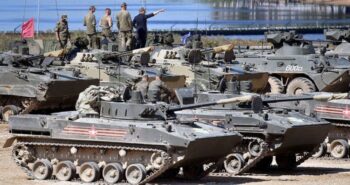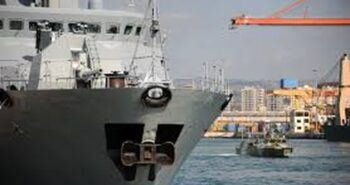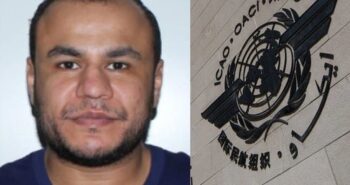By Saleh Sarar
 Tripoli’s just under two million residents used to fondly refer to their city as the bridal pearl of the Mediterranean Sea, thanks to its cultured serenity and quiet, a metaphor which they still nostalgically cling on to.
Tripoli’s just under two million residents used to fondly refer to their city as the bridal pearl of the Mediterranean Sea, thanks to its cultured serenity and quiet, a metaphor which they still nostalgically cling on to.
But this figure of speech hearkens back to better days belonging to a now distant past, when residents cared little about living in any other place other than a city which guaranteed security and efficient social services.
However, eight years of a vicious civil strife and a long, drawn-out battle for the Libyan capital between soldiers of an internationally backed government and the rag tag remnants of the Libyan National Army under warlord Khalifa Hafter has turned it into “an ugly pit of hellish siege” for civilians.
In the fury of the fighting which began on April 4 2019, whole districts of this once thriving city have been completely destroyed, with infrastructure reduced to desolate rubble.
The protracted stalemate of the conflict has scared the living daylight out of thousands of residents, many of whom have since fled to the relative safety of other parts of the country.
Others have sought refuge outside Libya, a country whose citizens were never into relocating to other countries during Gaddafi’s rule.
However, ‘the river of life in Tripoli has refused to run dry’, as one resident puts it to the African Press Agency.
For Al Said, one of those who have survived flying bullets and raining rocket and still brave the dangers of daily life, living literally between the smoking guns of two hostile forces constantly baying for each other’s blood, is the new normal in Tripoli.
It means literally dodging flying bullets and bombs while going about daily life as if it were the most normal of peacetime.
Said’s day job as a taxi driver exposes him to constant danger but he has no other choice but to face it with sometimes foolhardy courage while fending for his family.
He breathes nonchalance, seemingly oblivious of the mortal dangers lurking in the mean streets of the Libyan capital where sporadic and sometimes random gunfire rings out as people move around apparently deaf to the sounds brought by the harbingers of death.
“Just the other day I was coming from a road trip in the north when bullets flew past me and I had to duck as I drove past the middle of a turf war between the opposing fighters” Said explains.
But the thirty-something married man who lives in the Zawiyat al-Dahmani suburb straddling the north and south of Tripoli believes that’s beside the point he was trying to make.
He prefers talking about the struggles to feed his family, and as a Muslim leaves God to figure out his fate in this life, hoping of course for the best interest of his family.
“Although we can blame the war in Tripoli for causing us many problems such as lack of gasoline, but when there is life and health, there are other things to worry about” he tells the African Press Agency while queuing at a gas station, one of the very few still open for business in a city under siege.
Al Said has been queuing at the station for the better part of six hours to fill his tank and hit the traffic to serve other residents who like him refuse to be cowed out of their daily outdoor activities.
He acknowledges that living in the city is getting more dangerous by the hour, requiring pragmatism and not foolhardiness to survive.
Spending time at a coffee shop in the centre of Tripoli, university professor Ahmed Bashir has a contemplative glint in his eyes as he surveys the street which still bustles with fairly frenetic activity for a city caught up in conflict and for so long.
For all the raging battle for Tripoli, the south of the city where Professor Ahmad lives has been largely spared from flying bullets and raining rockets but residents like him still feel the aftermath of the conflict catching up with them.
“We suffer from the attacks on Miatiga International Airport, which has since closed down” he tells APA.
He says this means that the city has been starved of vital supplies of food and other basic items that are taken for granted in peacetime.
“Can anyone imagine a capital city without an airport” asks Dr. Ahmed can longer regularly teach at Tripoli University since it was repeatedly targeted with rockets earlier this year when it was suspected of backing one of the belligerents.
The university complex was very close to the theatre of the conflict, leaving hopeless students afraid of rocket fires which burst out regularly.
Unlike other universities in Tripoli which have been transformed into shelters for displaced people, Dr. Ahmed’s university is deserted and resembles a graveyard where no living human tarries.
Thus with the chaotic life around him the unengaged lecturer spends his time at the coffee shops, monitoring events around the conflict.
Another resident of Tripoli seems angry with everything going on in his city.
Displaying a stern expression on his face, youthful Osama Ali who has been waiting in a queue for almost five to withdraw some money from his bank to buy medicine for his sick mother has no kind words for his nation.
Mouthing a curse under his breath, Osama believes the problem with Tripoli suggests a deeper problem with Libya and Libyans who have not convinced themselves and the world why the revolution that swept Gaddafi away was worthwhile.
He says while the militias care more about fighting for turf, ordinary Libyans are unconcerned about the destruction this is unleashing in their lives.
“For us there is no tomorrow as long as this nightmare continues” he adds ruefully, craning his neck to scan the movement of the people in front of him in the queue.
Those who remain in Tripoli are struggling for everything including trying to make the best out of a very dangerous situation.
With this faith, the capital Tripoli is witnessing the mushrooming of coffee shops and food joints especially around the main thoroughfares leading to the city center. There people meet to barter news and discuss the conflict raging in the south of the capital.
An employee like Ali Waheed, a frequenter of the coffee shops every night says things cannot be any worse that it currently is.
“We are at the apex of the crisis in Tripoli and we hate war” he adds, shaking his head from side to side to emphasise the truthfulness of his point.
“We are not the tip of anybody’s spear in this conflict and all we want is the chance to live without fear of flying bullets snuffing out our lives…we want the chance to live again” he posits.
For him, Libyans should be thinking about how to catch up with the rest of the world when they meet in the coffee shops where stories of the conflict should be a footnote to daily life in their city and not a hot topic of discourse that they are practically witnessing.
Meanwhile not far from the zigzagging row of coffee shops, young boys, men and women carry empty water cans in the direction of a nearby mosque.
One of the women, Fauzia Ahmed complains that Tripoli was without fresh drinking water because an armed militia in the area have turned off the pipelines which carry water from the south to the north of the city.
She says the militia is using water as a bargaining chip to force the government in Tripoli to meet its demands.
“The water crisis rears its head from time to time but since the conflict in Tripoli flared up, it has been worse” she laments.
She says electricity is a luxury most parts of southern Tripoli cannot get for almost ten hours every day, coupled with the lack of money from the banks.
An official based in the south of Tripoli who requested anonymity says raining rockets and bullets have destroyed cultural life in the city including libraries and bookstores.
Even mosques and schools have not been spared.
He says although it would take some time to pick up the pieces, residents like him will continue to be resilient in the face of the conflict.
“We will continue to go out into the streets to enjoy life, the good weather against the sounds of bullets whizzing past” he adds.
As an afterthought he resorts to a metaphor to illustrate his point: “This is a conflict on the ground but it is not as if war is a state of mind for most residents of Tripoli…the truth is it is not and never will be”.
***
Saleh Sarar is a journalist based in Tripoli, Libya.I worked as news cater since 1980 both in radio and TV in Libya.
_________





